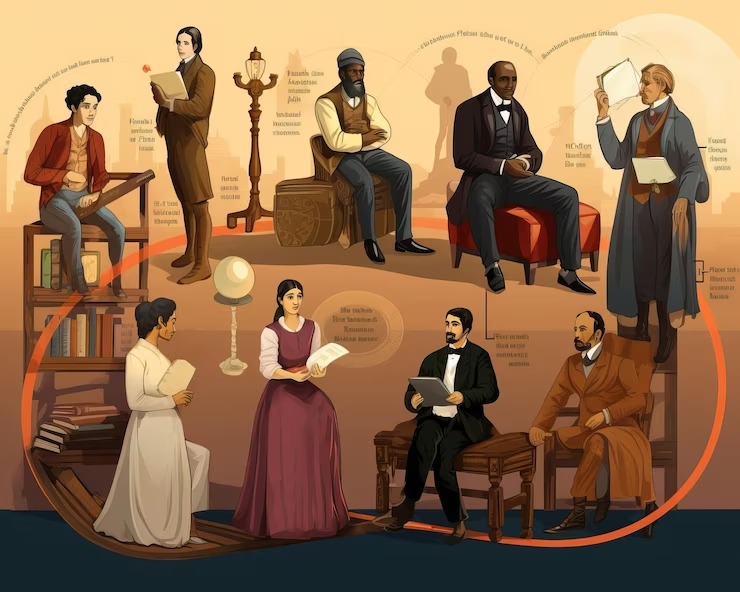History is a treasure trove of fascinating individuals whose lives and actions have left an indelible mark on society. These figures have shaped human history from visionary leaders to fearless revolutionaries. In this exploration of the most interesting historical figures, we delve into their lives, accomplishments, and the lasting impact they’ve had on the world.
Visionaries Who Changed the World
1. Leonardo da Vinci: The Renaissance Polymath
A True Renaissance Man
Leonardo da Vinci, born in 1452, was a true polymath of the Renaissance. His insatiable curiosity led him to excel in many fields, including painting, engineering, anatomy, and more.
Historical Significance
Artistic Genius: Da Vinci’s masterpieces, like the “Mona Lisa” and “The Last Supper,” are celebrated for brilliance.
Scientific Pioneer: His anatomical studies and designs for flying machines were groundbreaking in science and engineering.
History Question Answer: What were Leonardo da Vinci’s most famous artworks?
Leonardo da Vinci is best known for his artworks, including the “Mona Lisa” and “The Last Supper.” These iconic paintings have left an enduring mark on the world of art.
2. Nelson Mandela: The Anti-Apartheid Icon
A Symbol of Resilience
Nelson Mandela, born in 1918, was a beacon of hope during South Africa’s dark days of apartheid. He spent 27 years in prison, emerging to become the nation’s first black President.
Historical Significance
End of Apartheid: Mandela’s unwavering determination helped end apartheid, promoting racial equality in South Africa.
Global Symbol: He became a global symbol of peace and reconciliation, leaving a legacy of hope and justice.
History Question Answer: How did Nelson Mandela contribute to ending apartheid in South Africa?
Nelson Mandela played a pivotal role in ending apartheid through his unwavering determination and peaceful efforts, ultimately leading to his election as South Africa’s first black President.
Fearless Revolutionaries
3. Joan of Arc: The Maid of Orléans
A Warrior Saint
Joan of Arc, born in 1412, was a young French peasant who claimed divine guidance. She led French troops to victory during the Hundred Years’ War.
Historical Significance
Military Leadership: Joan’s military leadership played a vital role in turning the tide of the war in favor of the French.
Religious Icon: Her conviction and martyrdom made her a symbol of French nationalism and a revered historical figure.
History Question Answer: How did Joan of Arc impact the Hundred Years’ War?
Joan of Arc’s military leadership and unwavering resolve played a crucial role in tipping the balance in favor of the French during the Hundred Years’ War.
4. Mahatma Gandhi: The Father of the Indian Nation
A Champion of Nonviolence
Mahatma Gandhi, born in 1869, led the Indian independence movement against British colonial rule. He advocated for nonviolent civil disobedience.
Historical Significance
Independence: Gandhi’s nonviolent resistance and civil disobedience movements were instrumental in India gaining independence.
Inspiration Worldwide: He became an inspiration for civil rights and freedom movements across the globe.
History Question Answer: How did Mahatma Gandhi lead India to independence?
Gandhi’s nonviolent resistance and civil disobedience philosophy were pivotal in India’s quest for independence from British colonial rule.
Visionary Thinkers and Innovators
5. Marie Curie: The Pioneer of Radioactivity
A Trailblazer in Science
Marie Curie, born in 1867, was a physicist and chemist who conducted pioneering research on radioactivity, becoming the first woman to win a Nobel Prize.
Historical Significance
Nobel Laureate: Curie won Nobel Prizes in physics and chemistry, a feat unmatched by any other scientist.
Medical Breakthroughs: Her work in radioactivity had significant implications for medicine.
History Question Answer: What were Marie Curie’s Nobel Prizes for?
Marie Curie won Nobel Prizes in physics (1903) and chemistry (1911), recognizing her groundbreaking work in radioactivity.
6. Albert Einstein: The Genius Behind Relativity
A Revolutionary in Physics
Albert Einstein, born in 1879, is renowned for his theory of relativity, which transformed our understanding of space, time, and energy.
Historical Significance
Theory of Relativity: Einstein’s theory brought about a revolution in physics and led to the development of new technologies.
Nobel Prize: He was awarded the Nobel Prize in Physics in 1921 for explaining the photoelectric effect.
History Question Answer: What is Albert Einstein’s theory of relativity?
Albert Einstein’s theory of relativity encompasses both special and general relativity. Special relativity deals with objects moving at constant speeds, while general relativity extends this to gravity’s effects on space and time.
Leaders Who Shaped Nations
7. Queen Victoria: The Longest-Reigning Monarch
An Iconic Monarch
Queen Victoria, who reigned from 1837 to 1901, was the longest-reigning British monarch. Her era, known as the Victorian era, saw significant changes and progress.
Historical Significance
Industrial Revolution: Her reign witnessed the Industrial Revolution and the growth of the British Empire.
Cultural Impact: The Victorian era left a lasting cultural imprint on art, literature, and architecture.
History Question Answer: How did the Victorian era impact culture and society?
The Victorian era saw profound cultural impacts, influencing literature, art, and architecture. It was a period of significant change and progress during the 19th century.
8. George Washington: The Founding Father
The First President
George Washington, born in 1732, was a pivotal figure in the American Revolution and the first President of the United States.
Historical Significance
Revolutionary Leadership: Washington’s military leadership was instrumental in the American colonies’ victory against British rule.
Presidential Legacy: His leadership set crucial precedents for the U.S. presidency and the nation’s early years.
History Question Answer: How did George Washington contribute to the American Revolution?
George Washington’s military leadership as the Continental Army Commander-in-Chief was crucial in securing victory during the American Revolution.
Artists Who Redefined Creativity
9. Frida Kahlo: The Bold Self-Portraitist
An Artistic Maverick
Frida Kahlo, born in 1907, was a Mexican artist known for her striking self-portraits and her exploration of identity, pain, and passion.
Historical Significance
Iconic Art: Kahlo’s art remains celebrated for its bold self-expression and exploration of the human experience.
Feminist Figure: She is considered a feminist icon for her unapologetic portrayal of women’s experiences.
History Question Answer: How did Frida Kahlo’s art impact modern art and feminism?
Frida Kahlo’s art, with its unapologetic self-expression and exploration of the human experience, has profoundly impacted modern art and feminism.
10. William Shakespeare: The Bard of Avon
The Literary Legend
Born in 1564, William Shakespeare is renowned for his timeless plays and sonnets that profoundly influenced English literature and drama.
Historical Significance
Literary Legacy: Shakespeare’s works, including “Hamlet” and “Romeo and Juliet,” are cornerstones of world literature.
Language Evolution: He contributed significantly to the evolution of the English language.
History Question Answer: What are some of William Shakespeare’s most famous works?
William Shakespeare’s most famous works include “Hamlet,” “Romeo and Juliet,” “Macbeth,” “Othello,” and “A Midsummer Night’s Dream,” among others.
Conclusion
The most interesting historical figures have left an enduring legacy transcending time and place. From da Vinci’s artistic brilliance to Gandhi’s commitment to nonviolence, these individuals have shaped history and enriched our understanding of the world. Their impact on society and culture is immeasurable, making them perennial sources of inspiration and fascination. By studying their lives and accomplishments, we gain valuable insights into the complexities of the human experience and the power of individual actions to drive change.




